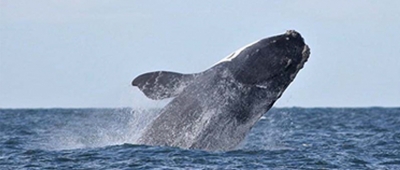The National Marine Fisheries Service and NOAA Fisheries announced proposed changes to vessel speed regulations on Friday, 29 July, with the goal of protecting the critically endangered North Atlantic right whale.
The new restrictions will expand current mandatory seasonal speed restrictions, which limits vessels to 10 knots in designated areas of the ocean, and would extend the speed limits to vessels measuring 35 to 65 feet in length.
“These two efforts are part of our North Atlantic Right Whale Road to Recovery, a strategy that encapsulates all of our ongoing work across the agency and in collaboration with our partners and stakeholders to conserve and rebuild the North Atlantic right whale population,” Janet Coit, assistant administrator for NOAA Fisheries and acting assistant secretary of commerce for oceans and atmosphere at NOAA, said in a release. “Despite the many challenges we face, including climate change, we must find solutions to mitigate the threats to marine mammals while supporting the livelihoods and economies of our fishing communities who put healthy food on our tables.”
Right whale protections have been a hot-button topic for the seafood industry. Lobstermen in the U.S. Northeast have had to cope with new rules imposed by NOAA on lobstermen to protect right whales after a court ruling that the fishery was in violation of the Endangered Species Act – new rules a federal judge said still don’t go far enough. The U.S. state of Maine’s congressional delegation, and Maine Governor Janet Mills have criticized both the new rules and the court ruling.
The Maine Lobstermen’s Association said that the new speed limit rules are likely to actually protect whales – unlike the regulations against lobstermen.
“While MLA will examine the proposed changes closely and submit official comments prior to the deadline, we are encouraged that NOAA has finally taken this step to address this very real threat to the North Atlantic right whale,” MLA Executive Director Patrice McCarron said in a release. “As NOAA makes clear, during the past two and a half years alone, it has documented four lethal (death and serious injury) right whale vessel strike events in U.S. waters. Data also show that there has not been a single known right whale entanglement in Maine lobster gear in almost 20 years, and Maine lobster gear has never been linked to a right whale death.”
Environmentalists also applauded NOAA’s efforts, saying it could be a “game-changer” for right whales.
“Given the glacial pace of new right whale protections over the last decade, immediately curtailing the second-biggest threat to their existence would be a game-changer,” said Erica Fuller, senior attorney at Conservation Law Foundation. The Conservation Law Foundation is one of the organizations that sued the federal government over its lack of action on right whales – resulting in the court ruling affecting the U.S. lobster industry.
Fuller added that the new law still has areas to address.
“This proposed rule is a major step forward, but there’s a five-month gap in protection south of Martha’s Vineyard and Nantucket that should be addressed,” Fuller said. “Federal officials must now get these protections in place on the water as quickly as possible and effectively enforce them.”
Even with potential gaps, conservationists are calling on NOAA to implement the policies as soon as possible.
“The agency has known for years that endangered right whales need more protections from speeding vessels, but it’s failed to act. This proposal is a step in the right direction, but it won’t help a single right whale until it’s actually finalized,” Center for Biological Diversity Oceans Legal Director Kristen Monsell said in a release. "The Fisheries Service needs to get this rule in place as quickly as possible. As right whales spiral toward extinction, they just can’t wait any longer for protections against getting run over and killed by vessels.”
Photo courtesy of NOAA

